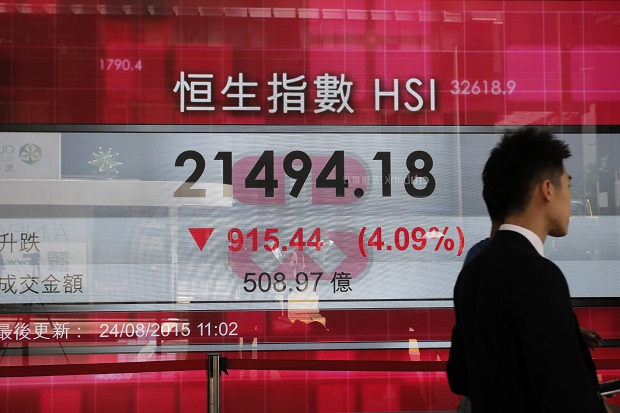Bloodbath in Asian stock markets

A man walks past an electronic board showing the Hong Kong share index outside a local bank in Hong Kong, Monday, August 24, 2015. Stocks got a dismal start to the week in Asia, with China’’s main index losing up to 8.6 percent Monday as investors shaken by the sell-off last week on Wall Street unloaded shares in practically every sector. AP
HONG KONG, China — Asian stocks were a sea of red Monday, with Shanghai slumping more than eight percent as deepening concerns about China’s stalling economy rattled equity investors around the world.
Oil prices fell after slipping below $40 a barrel for the first time in six years, as weak Chinese manufacturing data deepened worries about the slowdown in the world’s number two economy.
BACKSTORY: US oil falls below $40; lowest in six years
China-linked shares tumbled in early trading, with Hong Kong dipping 3.91 percent while Shanghai plunged 8.19 percent in early deals.
Tokyo dived 3.09 percent by late morning, while Seoul lost 1.88 percent and Sydney fell 2.89 percent, extending heavy losses from last week.
Article continues after this advertisement“Today has all the hallmarks of being one of the worst trading days of the past five years,” said Evan Lucas at IG Markets.
Article continues after this advertisement“The reaction from Asia today will be symptomatic of the current investor sentiment and belief that a hard landing (in China) is inevitable.”
The losses early Monday followed a steep fall in US and European stocks on Friday, while several commodities plunged to multi-year lows and emerging market currencies took a battering.
Global equities have lost more than $5 trillion in value since China’s shock currency devaluation on August 11 sparked fears the world’s number two economy is slowing more than thought.
Wall Street saw heavy falls on Friday, with the Dow Jones Industrial Average posting its worst single-day sessions in four years, after data showing Chinese manufacturing activity slowed to a 77-month low added to the gloomy picture.
Pension fund buying equities
China on Sunday said it would allow its huge state pension fund to buy equities, after a package of measures unleashed by Beijing last month to shore up equities failed to stem the rout.
The fund, which had some 3.5 trillion yuan ($550 billion) in net assets at the end of 2014, will be able to invest up to 30 percent in equities, according to state media.
But analysts said the move would not be enough to stem the losses in Chinese shares at a time when global market sentiment was bleak.
“The market is going to drop further. It’s normal as the markets across the whole world are falling,” Qian Qimin, an analyst from Shenwan Hongyuan, told AFP.
“The entry of the pension fund will take a long time to happen. And valuations are still not cheap.”
Oil prices also fell, after breaking below $40 barrel for the first time in six years Friday on concerns about waning demand in China, the world’s top energy importer.
Data showing the number of US drilling rigs rose last week, despite the slump in prices, added to concerns a global supply glut will last for years.
US benchmark West Texas Intermediate for October delivery fell 87 cents to $39.58 while Brent crude for October eased 81 cents to $44.65.
Jitters over China and the global economy saw traders drop the dollar and move into the yen — a safe haven in times of turmoil and uncertainty — while the currencies of Malaysia, Thailand and South Korea all hit fresh multi-year lows.
The greenback fell to 121.13 yen in Asia Monday, down from 122.06 yen in New York Friday. The euro was $1.1447 and 138.66 yen, mixed from $1.1386 and 138.97 yen.
Safe haven gold rose to $1,161.60 compared to $1,154.45 late Friday.
RELATED STORY